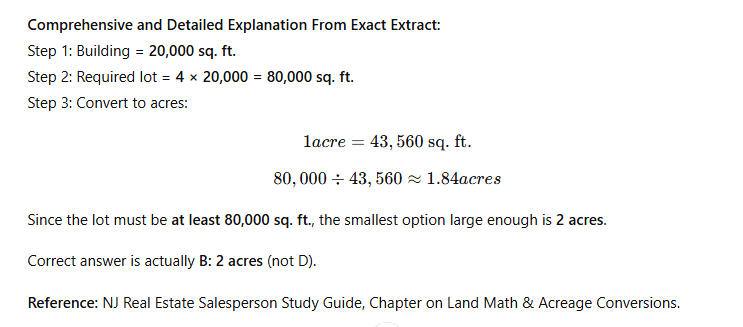Real Estate Licensing New Jersey Real Estate Salesperson Exam Practice Test
A city has built a new library and has contacted the broker to list and sell the old library building. Which approach should the broker use to estimate the fair market value for the purpose of listing and selling this property?
Answer : C
For special-purpose properties such as schools, churches, libraries, or government buildings, there are typically few comparable sales and the properties are not income-producing.
In these cases, appraisers use the cost (replacement) approach, which estimates the value by calculating the cost of replacing the structure minus depreciation, plus land value.
Correct answer: C. replacement cost.
A listing agent presents a signed offer to a seller who then changes the amount of the down payment. Before presenting the counteroffer to the buyer, the New Jersey Real Estate License Law requires the listing agent to
Answer : B
Under NJ Real Estate License Law and Commission regulations (NJAC 11:5-6.2), all material changes to a written offer must be acknowledged in writing by the party making the change before it can be treated as a counteroffer. This is typically done by having the seller initial and date the change on the offer form. Without the seller's written confirmation (initials), the revision is not valid or binding.
A is unnecessary; broker consent is not required for counteroffers.
C is not required unless the parties specifically use an addendum, but initials are the minimum legal requirement.
D is insufficient; oral notice is not valid without written confirmation.
Therefore, the correct answer is B.
(Reference: NJ Real Estate Salesperson Pre-Licensure Course Study Guide, Contracts & License Law---Handling Offers and Counteroffers; NJAC 11:5-6.2.)
Which of the following differentiates a bilateral contract from a unilateral contract?
Answer : B
A bilateral contract involves mutual promises where both parties are obligated to perform (e.g., a sales contract: buyer promises to pay, seller promises to transfer title).
A unilateral contract involves only one party making a promise contingent on the performance of the other (e.g., an option contract).
Thus, the key difference is performance obligations of the parties.
Correct answer = B.
A national company desires a parcel of land which must be 4 times the size of its proposed building. If the building design includes 20,000 square feet, then which of the following minimum sized lots should be purchased?
Answer : D

In surveying, monuments are used to establish:
Answer : B
Monuments are fixed physical objects (iron pins, concrete markers, trees, rocks) used by surveyors to establish property boundaries in the metes-and-bounds system.
They do not establish addresses, flood elevations, or historical sites.
Correct answer = B.
Two real estate firms shared equally a 6% commission on the sale of a house. The listing licensee was paid 60% of the broker's share. The house was sold for $110,000. How much did the listing agent earn?
Answer : B
Calculation (Finance/Math section of the NJ Real Estate Salesperson Pre-Licensure Course Study Guide):
* Total commission = $110,000 6% = $6,600
* Two firms split equally: each broker gets $3,300
* Listing licensee paid 60% of broker's share: $3,300 0.60 = $1,980
Thus, the listing agent's earnings are $1,980.
(Reference: NJ Real Estate Salesperson Pre-Licensure Course Study Guide, Math for Salespersons---Commission Splits.)
The following statement was found in a real estate sales contract: "In the event of a default by the purchaser, the forfeiture of the earnest money to the seller will be the only compensation to which the seller will be entitled." This statement most likely describes a:
Answer : B
A liquidated damages clause specifies in advance the amount of money or type of damages one party will receive if the other party defaults.
In this case, the earnest money deposit forfeiture is the seller's only compensation in the event of buyer default.
A broker protection clause protects a broker's commission rights.
Indemnification clauses shift liability to another party.
A default delivery clause is not a standard real estate term.
Thus, the correct clause is B: liquidated damages clause.